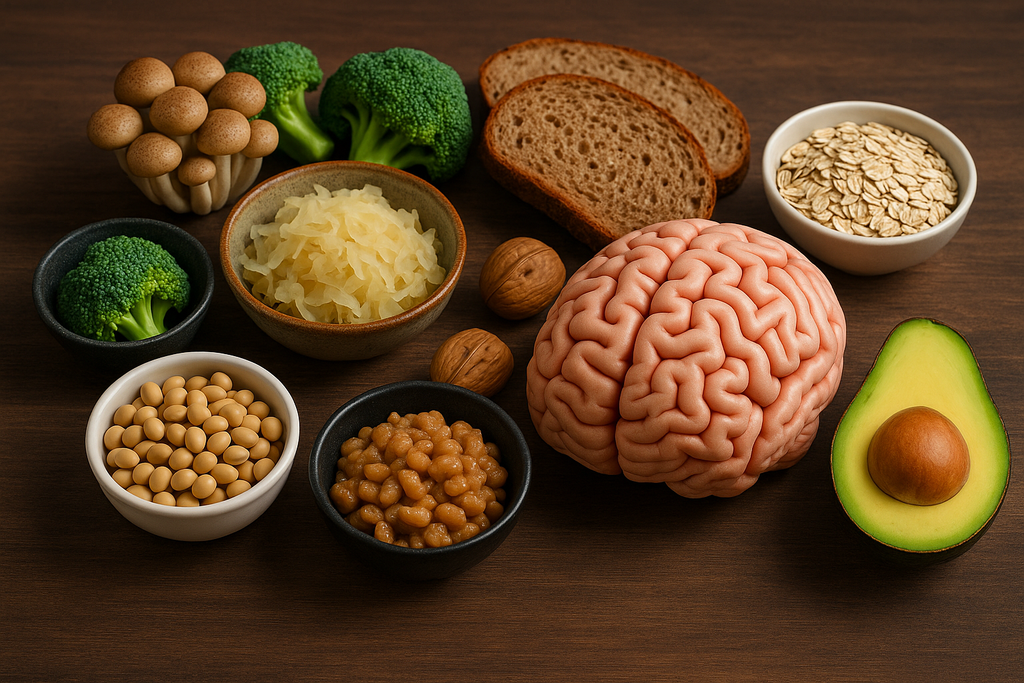News — cognitive health
Foods That Prevent Cognitive Decline: Why Polyamines Are the Missing Link
Alzheimer's prevention anti-aging foods autophagy brain detox brain food cognitive health dementia diet fermented foods gut-brain connection healthy aging memory loss prevention mental clarity foods natural nootropics neuroprotection nutritional neuroscience plant-based brain foods polyamines spermidine spermidine supplements spermine
As the global population ages, cognitive health is becoming an increasingly important topic. From Alzheimer’s disease to age-related memory loss, the quest for preventive strategies has intensified—and diet plays a crucial role. Among the many nutrients and compounds linked to brain health, a class of naturally occurring compounds called polyamines has recently gained attention for their potential to slow or even prevent cognitive decline.
Polyamines, such as spermidine and spermine, are found in various foods and play a vital role in cellular growth, gene expression, and neuroprotection. Emerging research shows that polyamines may support cognitive longevity by enhancing autophagy (the body’s natural cell-cleaning process), reducing inflammation, and protecting neurons from degeneration. In this article, we explore the science behind polyamines and identify the top foods that can help preserve brain health as we age.
The Dual Power of Moringa Seeds: Clean Water and Better Health
anti-inflammatory antioxidants clean water climate-resilient crop cognitive health herbal medicine moringa benefits moringa for blood sugar moringa for health moringa oil moringa oleifera Moringa seeds moringa tree natural detox natural remedies natural water filter plant-based nutrition superfood sustainable living water purification
Moringa oleifera, often hailed as a "miracle tree," is a plant of immense value, with every part of it offering profound benefits. While its leaves are a well-known superfood, the seeds hold a unique dual power that extends far beyond simple nutrition. Packed with potent compounds, moringa seeds have been traditionally used for both health and environmental purposes, serving as a testament to the plant's incredible versatility.
Miracle tree has a remarkable dual capabilities of moringa seeds: their ability to purify water and their significant contribution to human health. We will delve into the science behind their coagulant properties, which make them a natural and sustainable solution for water treatment, and examine their rich nutritional profile and medicinal effects. By understanding the full scope of their power, you can unlock a new appreciation for this humble yet mighty seed.
Lion’s Mane Mushroom and Nerve Regeneration: What the Research Reveals
Alzheimer’s natural support brain plasticity cognitive health erinacines hericenones Lion’s Mane mushroom medicinal mushrooms memory support mushroom supplements mycelium vs fruiting body natural nootropics nerve regeneration nerve repair neurodegenerative disease neurogenesis neuropathy support neuroprotection neurotrophic factors NGF stimulation Parkinson’s mushroom research
In the world of medicinal mushrooms, Lion’s Mane (Hericium erinaceus) has carved out a reputation not just as a culinary delicacy but as a powerful brain and nerve tonic. Known for its cascading white spines that resemble a lion’s mane, this mushroom has been used in traditional Chinese and Japanese medicine for centuries to support cognitive health, digestion, and vitality.
Modern science has taken particular interest in Lion’s Mane because of its potential role in nerve regeneration. Compounds found in the mushroom, such as hericenones and erinacines, appear to stimulate nerve growth factor (NGF), a protein essential for the growth and repair of neurons. With neurodegenerative diseases and cognitive decline on the rise, the possibility that a natural food could support nerve repair is nothing short of captivating. In this article, we’ll dive into the research on Lion’s Mane and nerve regeneration, explore the evidence behind its claims, and separate scientific promise from speculation.
Boost Your Brainpower: The Benefits of Cognitive Training
boost mental performance brain fitness brain training techniques brainpower cognitive decline prevention cognitive health cognitive training enhance brain function focus enhancement memory and focus strategies memory improvement mental acuity mental exercises mental stimulation activities neurocognitive exercises neuroplasticity sharp focus tips
In today’s fast-paced world, maintaining peak mental performance is more important than ever. Cognitive training, a series of mental exercises designed to enhance brain function, has gained recognition for its ability to improve memory, focus, and overall mental acuity.
This article explores the benefits of cognitive training, its impact on brain health, and actionable strategies for incorporating it into your daily routine to unlock your full cognitive potential.
Discover Tarragon's Calming Benefits for Mental Health
antioxidants calming herbs cognitive health essential oils herbal remedies herbal supplements herbs for sleep holistic wellness mental well-being natural stress relief sleep improvement stress reduction tarragon anxiety tarragon benefits tarragon mental health tarragon relaxation tarragon side effects tarragon supplements tarragon tea traditional medicine
Tarragon, a lesser-known herb in mental health discussions, holds an impressive reputation in culinary circles and traditional medicine. Known for its subtle, licorice-like flavor, tarragon has been valued for centuries for its ability to enhance dishes and promote overall well-being. However, its potential role in mental health has recently come to the forefront, inspiring researchers and holistic health advocates alike.
In today’s fast-paced world, where stress, anxiety, and burnout have become part of everyday vocabulary, natural remedies like tarragon are gaining popularity. This aromatic herb offers calming properties and supports emotional well-being in ways that are both intriguing and promising. Whether used in teas, essential oils, or as a supplement, tarragon's potential to ease mental tension and improve cognitive function is worth exploring.





